From sharing home to sharing your life with your dog, there is nothing that stops us from pampering our canine friend ever. We may offer our favorite food to the dog thinking it is as good for them as it is for us. However, since the metabolism of humans and dogs differ significantly, you need to precariously share only the food that is good for the dog. Few human foods may wreck the dog’s body in ways you would never imagine. Below is a list of human foods that dogs can and can’t eat:
Contents
What Human Foods Can Dogs Eat
Bread: When given in small quantities, plain bread without any spices are okay for the dog to eat. Since bread is nothing but carbohydrates and lot of calories, they do not provide any nutritional benefit to the dog. You can bake the breads at home to avoid feeding preservatives and added sugar to the dog. It is better to avoid it as much as you can.
Cashews: Dogs can savor cashews. Give them only a couple of cashews at once. They are filled with proteins, magnesium, calcium, and antioxidants. But they also contain fat that can cause unnecessary weight gain and fat-related problems. Unsalted cashews can be given once in a while and salted once should be completely avoided.
Carrots: Bite-sized carrots can make a good snack for your dog to chew on throughout the day. Raw as well as cooked carrots can be given as treats to the dog. They have lesser calories and more fiber, minerals, and vitamins. So a healthy and easy treat.
Cheese: This irresistible human food can be given to the dog in smaller portions. Rarely are the dog’s lactose intolerant, if your dog does not have this rare condition then cheese is a great snack for them. Cheese is fattening so opt for a lower-fat one like mozzarella or cottage cheese.
Coconut: Filled with lauric acid that helps in combating viruses and bacteria, coconuts are good for the dogs. If your dog has a bad breath and skin conditions like flea allergies, hot spots, or itchy skin, coconut can do wonders. Even the oil and milk from this fruit are safe to consume for the dogs. Avoid the outer covering of coconut as it can get stuck in their throat.
Corn: Corn can be found easily in the dog foods as they are healthy and good for the dogs. The corn cob isn’t digestible and can cause blockage in the intestines. Give corns that are not on the cob and your dog can enjoy this healthy treat.
Eggs: Eggs are safe to consume by dogs and can act as their meal itself. Be sure to give them cooked ones as they are a great source of protein. It can also treat an upset stomach. Raw egg whites can help with biotin deficiency if any. In any form, eggs should not be given in the uncooked form to your lovely pet.
Fish: Dogs can easily eat fish. They are rich in good fats, amino acids thus acting a health boost. Salmons are loaded with protein and vitamins and sardines with their soft and digestible bones are a great source of calcium. If you are feeding any other fish apart from sardines, then remove any tiny bones from the fish carefully. Do not feed uncooked and undercooked fish to the dog. Fully cooked and properly cooled fish can be fed to the dogs. Do not offer it more than a couple of times during a week.
Ham: Not very healthy but can be definitely given to the dog in small portions. Ham has high fat and sodium content so they are not good for eating every day.
Honey: This elixir is safe for consumption by your dog. Packed with lots of nutrients including Potassium, calcium, magnesium, copper, Vitamins A/B/C/D/E/K and antioxidants they can help your dog with allergies. Since honey introduces pollen to the digestive systems it helps in building immunity against allergens. Another advantage of honey apart from eating is that this sticky substance can be used as an ointment for cuts and burns.
Milk: Good for vegetarian dogs. Many dog owners feed bread and milk or milk with other dog food to their pets. Before starting out with milk, make sure that your dog isn’t lactose intolerant and can digest milk properly. Sometimes a small quantity may not show any symptoms, so be careful and notice any behavioral changes in the dog.
Peanut Butter: Dogs can enjoy peanut butter to any extent. This is an excellent protein source for your dog. Filled with healthy fats good for heart, Niacin, Vitamin B and Vitamin E, raw and unsalted peanut butter makes a healthy snack option for the dog. However, make sure that it does not have xylitol as an ingredient. It is used as a sugar substitute which can prove to be toxic to the dogs.
Peanuts: Peanuts are good for dogs. Unlike other nuts, peanuts are safer for dogs. They have lots of good fat, proteins that are healthy for the dog. Since they are rich in fat, control their intake as it can cause issues related to the pancreas. Do not give salted peanuts.
Popcorn: A good snack for dogs. Unbuttered, unsalted popcorn is ok for the dog if given in moderation. Popcorns contain thiamine and riboflavin which aids digestion and eye health. They also contain small quantity of protein and iron. Pop the corn kernels completely before feeding it to the dog. The kernels might cause choking.
Pork: Pork can be eaten by dogs. It is a completely digestible protein that is filled with amino acids and has more calories when compared with other meats. In comparison with other proteins, pork will less likely cause any allergic reaction to your dog.
Quinoa: Ok to eat. Quinoa is used in some good quality dry foods for dogs. It has a strong nutrition profile and is a healthy option compared to the starches made from wheat, soy, and corn that are used in making kibble.
Salmon: A go-ahead for your dog as long as it is completely cooked. A fully cooked one is a great source of healthy fats, protein, and amino acids. It promotes brain and joint health. It also boosts the immune system of the dog. Raw and uncooked salmon may contain parasites that can make your pet sick and lead to diarrhea, dehydration, and vomiting. It may sometimes also cause death. Hence cook it well so that the parasites do not exist anymore.
Shrimp: Good for your dog. Sometimes throwing in a few shrimps in your dogs’ plate is a good idea. They are rich in phosphorous, vitamin B12, and antioxidants. The fat, carbohydrate, and calories are on a lower side in this human food. Remove it completely from the shell and cook it properly before feeding it to the dog.
Tuna: Dogs can enjoy tuna. Fully cooked and fresh tuna is rich in omega-3 fatty acid that improves the eye and heart health in dogs. The canned tuna contains a small quantity of sodium and mercury which are not good for your dog. Avoid the canned ones and serve them fresh tuna now and then. Even if you want to give them the canned tuna and juice, only serve a little which is completely bland in taste.
Turkey: They can eat it. This human food is ok for the dog as long as it is cooked properly. The excess skin and fat should be removed from the meat. Make sure there are no bones in it. If bones are consumed it may cause tears on blockage in intestines. Any meat, including turkey, should be made with less salt, seasonings, garlic or onion. It is best to avoid these spices completely.
Grains: Dogs can consume grains including wheat. All grains are healthy for the dog. Wheat, corn is filled with fiber, fatty acids, and protein. They are completely safe for the dogs to consume and it is not necessary to make your dog grain-free. Only if they are allergic to the grains, they should be avoided completely.
Yogurt: Dogs can eat yogurt. As long as you are giving plain yogurt to the dog, it is a good snack. The active bacteria in it helps in strengthening the digestive system. The probiotics in yogurt are beneficial to the dogs. Flavored yogurts with artificial sweeteners and preservatives should be avoided completely. If your dog is lactose intolerant or cannot digest dairy products then do not feed him yogurt.
What Foods Are Toxic to Dogs
Almonds: Dogs shouldn’t be given almonds as they can cause the windpipe to tear if they are not chewed properly. It can also block the dog’s esophagus. Salted almonds are even more dangerous as it retains water in the body that can lead to severe heart-related problems in the dog.
Avocados: Dogs should never eat avocado. Avocados contain a toxin named persin that has proven to be a poison for dogs. It leads to the accumulation of fluid in the dog’s chest and lungs causing breathing difficulties, deprivation of oxygen or even death. This toxin is present in the fruit, leaves, pit, and bark of avocado. Hence you should avoid this fruit at all costs.
Chocolate: As tempting as it may sound to let your dog enjoy this divine treat, chocolates are harmful to your dog. Toxic substances like methylxanthines present in chocolate can hamper the metabolic process of the dog. Dark chocolate, even a little can cause vomiting and diarrhea. If given in a bigger quantity it may lead to irregular functioning of the heart, seizures or death. Keep chocolates in a safe place away from the dogs’ reach.
Cinnamon: Though cinnamon does not have any toxic effect on the dogs, we suggest you avoid it as much as possible. Cinnamon can cause irritation in the mouth that can make them sick. The blood sugar levels also drop by its intake and can cause vomiting, diarrhea, fluctuating heart rate, liver disease. If the cinnamon powder is inhaled, then it can lead to breathing difficulties, choking, and coughing.
Garlic: This food a part of the Allium family is not suitable for dogs. Other counterparts like leeks, chives, and onions are also not suggested for dogs’ intake. Garlic is much more toxic than the other Allium plants. Consuming garlic can lead to anemia, with side effects like elevated heart rate, pale gums, weakness or may lead them to collapse. The side effects may take a few hours or even days to show. If your dog has eaten this by mistake then monitor him for a few days after the consumption.
Ice Cream: This is not a good treat for your dog. Ice cream is refreshing for humans and one might think it will give the same happiness to your dog. But beware of all the added sugar in it. Those are not healthy for your dog. Few dogs are lactose intolerant as well. If you want to give an icy treat to your pet freeze fruit chunks and give it to them. You can use strawberries, apples, raspberries, and bananas.
Macadamia Nuts: These nuts should never be given to the dog. They are considered as one of the poisonous food for a dog. Part of the Proteaceae family, the Macadamia nuts can cause an increase in body temperature, vomiting, Lethargy, and inability to walk. If serious, it can also damage the nervous system.
These are some of the human foods that can or can’t be eaten by your dog. We suggest consulting your vet before including any of the above food in their diet. If you notice any uncommon behavior in your dog after he has consumed human food immediately rush him to the vet.
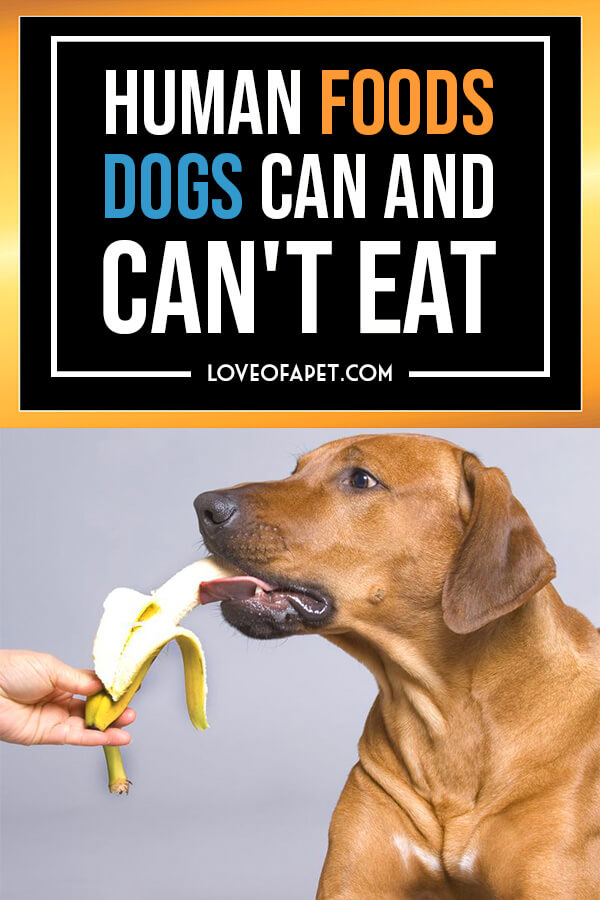
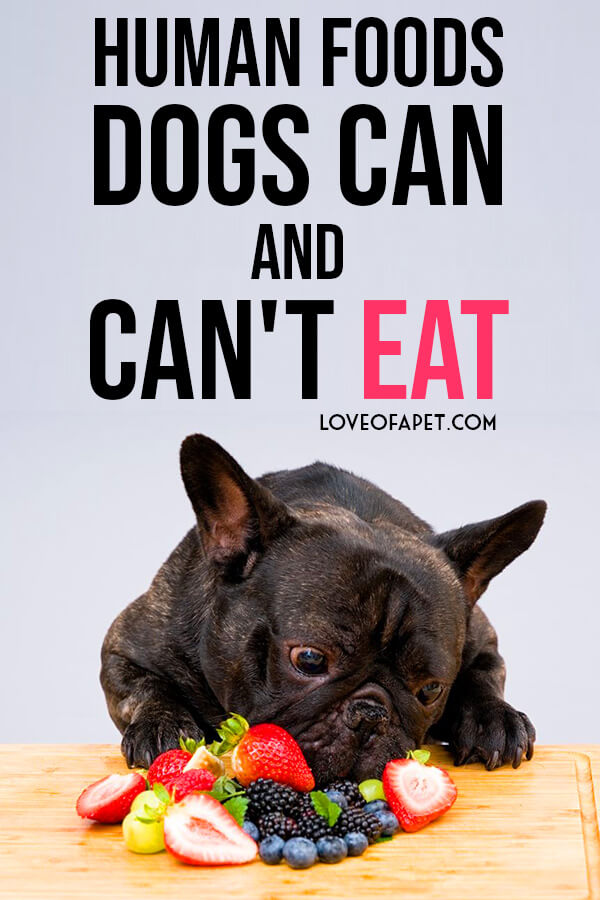

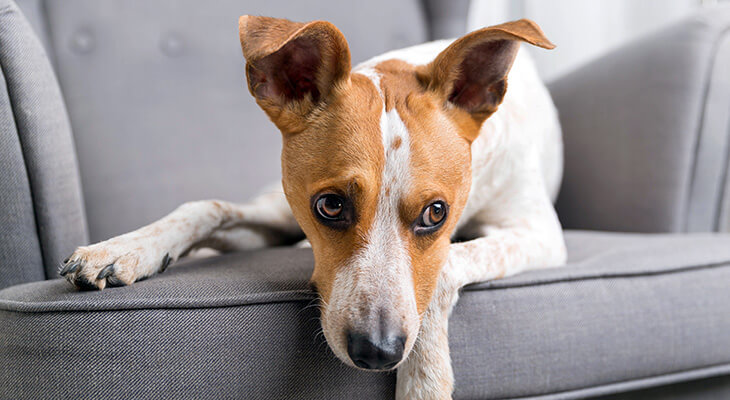
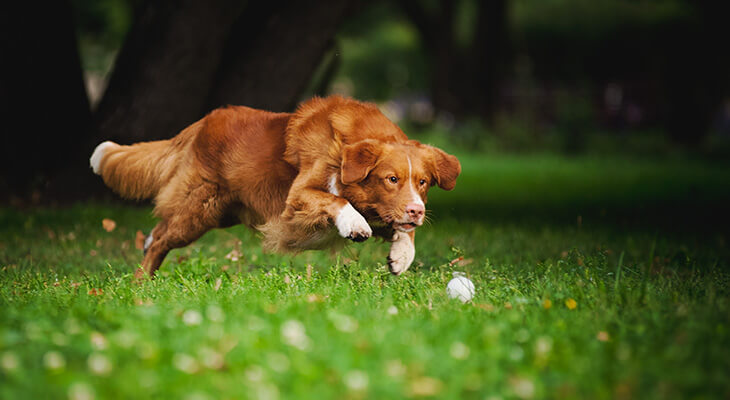

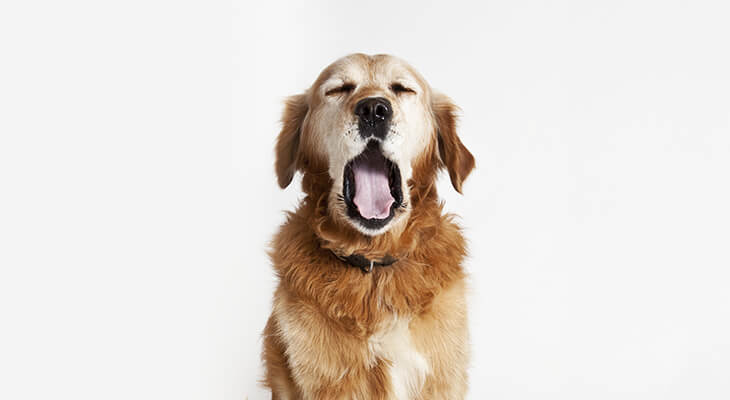
Thank you for a good list that included a few surprises for me! I knew that things like eggs, cheese, and carrots were good for our tail-wagging friends, but was unaware that fish, shrimp, honey and peanut butter were also good for them.
Likewise, I was aware that chocolate and garlic were bad and/or toxic to dogs, but was unaware that almonds, avocados, and ice cream were also dangerous.
Again, thank you for a great article!
Sadly this list has omitted a very crucial item not to feed your dog. That item is grapes and related products such as raisens and sultanas. They are very toxic to dogs. Our dog had to be euthanased due to kidney failure, after injesting a mince pie (fruit, raisens) while visiting a friend during Christmas.
I AM SO SORRY! THAT IS HEARTBREAKING. I DO NOT KNOW WHAT I WOULD DO WITHOUT MY DOODLE BOYS! I AM SO SORRY FOR YOUR LOSS. THANK YOU FOR SHARING.
Thank you for your list.I have been giving my dog vanilla ice cream in a cup, I didn’t know ice-cream was bad for them.
Thank you, Debra, for your response! I’m so saddened to learn about you dog. We gave grapes, frozen, to all of our dogs till I read about NO grapes or raisins. After talking with our vet, we stopped the offering of these fruits. We do share lots of our foods with our dogs; we are vegans, and they receive all of the veggies and fruits they could want from our diet. Again, thank you for responding — we noticed those items missing, too. OH, omit the artificial sweetener, xylitol. It is very dangerous for dogs!!!
Sadly a lot of foods my Chihuahua loves were not included. My Maxie loves peas and carrots. banana, cabbage and lettuce, and homemade oatmeal cookies.